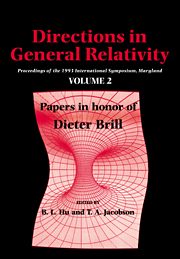 Directions in General Relativity
Directions in General Relativity Book contents
- Frontmatter
- Contents
- Contributors
- Symposium Program
- Papers from both Volumes Classified by Subjects
- Preface
- Dieter Brill: A Spacetime Perspective
- Thawing the Frozen Formalism: The Difference Between Observables and What We Observe
- Jacobi's Action and the Density of States
- Decoherence of Correlation Histories
- The Initial Value Problem in Light of Ashtekar's Variables
- Status Report on an Axiomatic Basis for Functional Integration
- Solution of the Coupled Einstein Constraints On Asymptotically Euclidean Manifolds
- Compact Cauchy Horizons and Cauchy Surfaces
- The Classical Electron
- Gauge (In)variance, Mass and Parity in D=3 Revisited
- Triality, Exceptional Lie Groups and Dirac Operators
- The Reduction of the State Vector and Limitations on Measurement in the Quantum Mechanics of Closed Systems
- Quantum Linearization Instabilities of de Sitter Spacetime
- What is the True Description of Charged Black Holes?
- Limits on the Adiabatic Index in Static Stellar Models
- On the Relativity of Rotation
- Recent Progress and Open Problems in Linearization Stability
- Brill Waves
- You Can't Get There from Here: Constraints on Topology Change
- Time, Measurement and Information Loss in Quantum Cosmology
- Impossible Measurements on Quantum Fields
- A New Condition Implying the Existence of a Constant Mean Curvature Foliation
- Maximal Slices in Stationary Spacetimes with Ergoregions
- (1 + 1)-Dimensional Methods for General Relativity
- Coalescence of Primal Gravity Waves to Make Cosmological Mass Without Matter
- Curriculum Vitae of Dieter Brill
- Ph. D. Theses supervised by Dieter Brill
- List of Publications by Dieter Brill
Coalescence of Primal Gravity Waves to Make Cosmological Mass Without Matter
Published online by Cambridge University Press: 06 January 2010
- Frontmatter
- Contents
- Contributors
- Symposium Program
- Papers from both Volumes Classified by Subjects
- Preface
- Dieter Brill: A Spacetime Perspective
- Thawing the Frozen Formalism: The Difference Between Observables and What We Observe
- Jacobi's Action and the Density of States
- Decoherence of Correlation Histories
- The Initial Value Problem in Light of Ashtekar's Variables
- Status Report on an Axiomatic Basis for Functional Integration
- Solution of the Coupled Einstein Constraints On Asymptotically Euclidean Manifolds
- Compact Cauchy Horizons and Cauchy Surfaces
- The Classical Electron
- Gauge (In)variance, Mass and Parity in D=3 Revisited
- Triality, Exceptional Lie Groups and Dirac Operators
- The Reduction of the State Vector and Limitations on Measurement in the Quantum Mechanics of Closed Systems
- Quantum Linearization Instabilities of de Sitter Spacetime
- What is the True Description of Charged Black Holes?
- Limits on the Adiabatic Index in Static Stellar Models
- On the Relativity of Rotation
- Recent Progress and Open Problems in Linearization Stability
- Brill Waves
- You Can't Get There from Here: Constraints on Topology Change
- Time, Measurement and Information Loss in Quantum Cosmology
- Impossible Measurements on Quantum Fields
- A New Condition Implying the Existence of a Constant Mean Curvature Foliation
- Maximal Slices in Stationary Spacetimes with Ergoregions
- (1 + 1)-Dimensional Methods for General Relativity
- Coalescence of Primal Gravity Waves to Make Cosmological Mass Without Matter
- Curriculum Vitae of Dieter Brill
- Ph. D. Theses supervised by Dieter Brill
- List of Publications by Dieter Brill
Summary
Abstract
We propose primal-chaos black holes (PCBHs) as candidates for the missing mass. Beginning with a discussion of the mystery of the missing mass, in its various formulations, we motivate PCBHs as “dark matter.” Envisioning black hole production from colliding gravity waves, we develop a model of time symmetric, axially symmetric gravity waves by making use of the Brill methodology. Through numerical spectral-element techniques, the geometry of space is determined. We discuss trapped surfaces as the signatures of impending collapse to a black hole, and are thereby able to identify, through numerical relaxation, which geometries will undergo gravitational collapse. We are thus able to determine the critical wave amplitude at which black hole production from imploding gravity waves begins. We conclude with a brief discussion of observational limits.
Introduction
“I just can't understand it. All the young men I know are retiring.” So exclaimed Mrs. Niels Bohr in a post-war visit to Princeton on seeing Paul Dirac look from floor to ceiling and back again to floor in a desperate effort to answer her question, “Who is there now at Cambridge? Is Robert Frisch still there?”
“Frisch is retiring. I cannot remember who else is there, except me.”
Any thought of Brill retiring is foreign to anyone who sees him in action, as vigorous now as he was in his Princeton undergraduate (A.B. 1954) and graduate (Ph. D. 1959) days.
- Type
- Chapter
- Information
- Directions in General RelativityProceedings of the 1993 International Symposium, Maryland: Papers in Honor of Dieter Brill, pp. 339 - 358Publisher: Cambridge University PressPrint publication year: 1956
- 1
- Cited by
